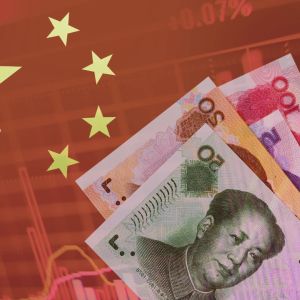China is trying everything it can to save the yuan from drowning, but every move seems to sink it deeper. In its bid to hold the line against a relentless dollar, Beijing has turned its financial system into a pressure cooker. The cost of borrowing through seven-day interbank pledged repurchase contracts — a key short-term funding tool — just hit its highest level since October 2023. The spread between this rate and the PBOC’s reverse repo reference rate is now at its widest since early 2021. For a country already struggling with slow growth, this liquidity crunch couldn’t have come at a worse time. Liquidity evaporates as the PBOC scrambles The PBOC has been on a rollercoaster. Last September, it threw monetary stimulus at the economy to spark growth. Now it’s doing the opposite, tightening liquidity to keep the yuan from slipping further. This week, Beijing ramped up its support with stricter capital controls and vows to curb market disruptions. Last week, it even suspended government bond purchases to stop a frenzy of debt buying. But these decisions are drying up cash in the system. Analyst Zhou Guannan of Huachuang Securities says the liquidity gap ahead of Lunar New Year could hit 1.5 trillion yuan ($205 billion). That’s a massive hole, especially with tax payments and maturing PBOC loans already draining funds. “The PBOC is carefully managing the pace of liquidity provision, now that currency stability becomes a priority,” Zhou wrote in a note. On Tuesday, non-bank financial institutions were borrowing cash overnight at rates as high as 3.8%, while others were forced to pay up to 5%, according to traders. These high rates are piling pressure on banks and corporate debt issuers that desperately need cheap funding to survive. The yuan is under heavy fire from a dollar boosted by strong U.S. economic data and rising inflation expectations under Trump’s policies. The offshore yuan was trading at 7.3474 per dollar on Tuesday, a far cry from the sub-7 levels seen in September. Seasonal cash demand adds to the chaos China’s timing couldn’t be worse. The week-long Lunar New Year holiday starts on January 28, and cash demand always spikes ahead of it. Families withdraw money for spending and gift-giving, leaving banks scrambling to cover the outflow. Seasonal pressures are making an already bad liquidity squeeze even worse. Traders are also keeping a close eye on how far the PBOC will go to keep borrowing costs in check. If rates climb too high, it could derail corporate financing and undermine economic growth. Governor Pan Gongsheng has reassured markets that the PBOC will use tools like interest rates and reserve requirement ratios to keep liquidity flowing. Still, market strategists like Wee Khoon Chong from BNY Mellon believe the central bank will need to do more. “The PBOC is likely to step up liquidity through 14-day reverse repo operations during the festive period,” Chong said, adding that further cuts to interest rates or reserve requirements could come later this year. Even the overnight repo rate, another key indicator of short-term liquidity, has surged to its highest level since August. The signs aren’t good, and the markets are feeling the strain. The dollar dominates, and China struggles to keep up The dollar is riding high, powered by a resilient U.S. economy and Wall Street’s confidence in Trump’s aggressive policies. Major banks like Goldman Sachs , Deutsche Bank, and TD Securities are all forecasting further dollar strength this year. Hedge funds and asset managers are also bullish, with total long bets on the dollar reaching $33.7 billion, according to recent data. “The dollar will stay on top,” said Helen Given, a foreign exchange trader at Monex. The Bloomberg Dollar Spot Index has risen for five straight sessions, and analysts believe it’s on track to test its November 2022 peak. Speculative traders are preparing for more gains, with the cost of hedging against a stronger dollar hitting its highest level in nearly two years. Trump’s tariff policies are only adding fuel to the fire. His promises of harsh tariffs have sent shockwaves through global markets, widening the interest rate gap between the Federal Reserve and other central banks. “With tariff worries adding uncertainty about global growth and inflation, the Fed is likely to respond by pausing rate cuts,” said Paresh Upadhyaya, director of fixed income and currency strategy at Amundi US. The fallout is global. The euro has dropped below parity against the dollar, reaching its lowest point in two years. The British pound is also struggling, trading at levels not seen since late 2023. Even the Australian dollar has been dragged down to its weakest since the early pandemic. Deutsche Bank is betting on more weakness from other currencies. Its strategists predict the dollar-yen pair will hit 160, even if Japan raises rates. The euro, meanwhile, is expected to stay in a range of 0.95 to 1.05 against the dollar, as the European Central Bank lags behind the Fed in policy changes. From Zero to Web3 Pro: Your 90-Day Career Launch Plan




















